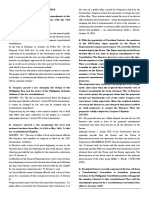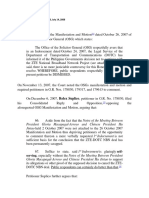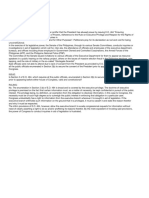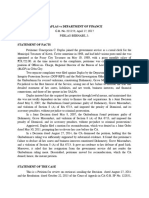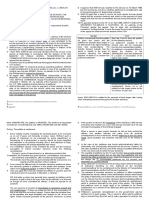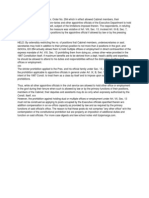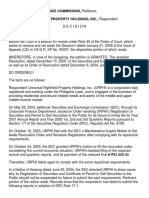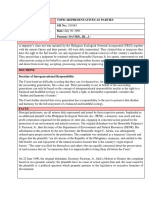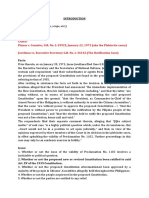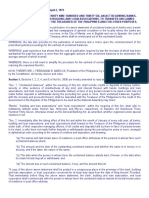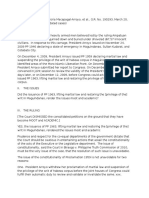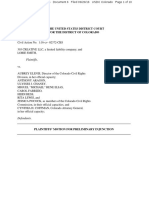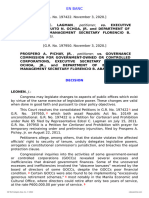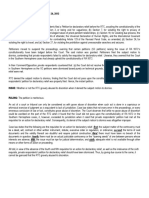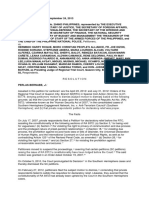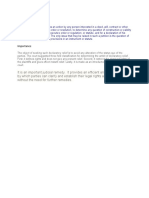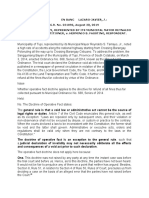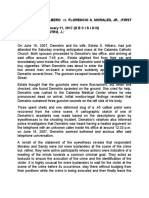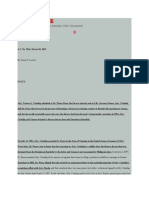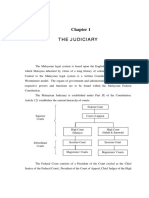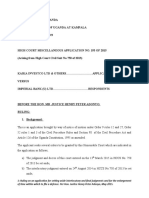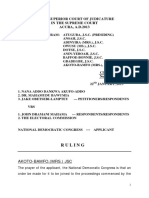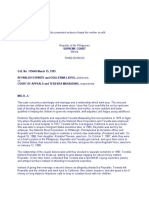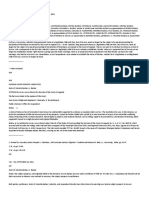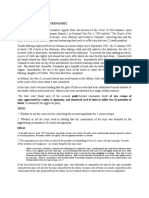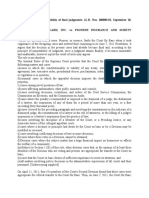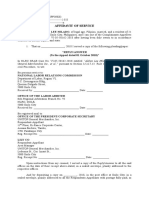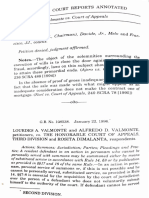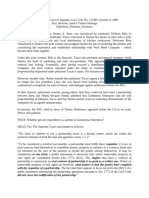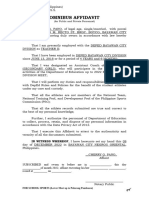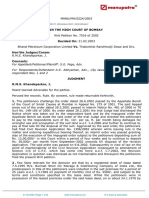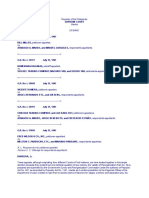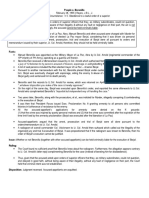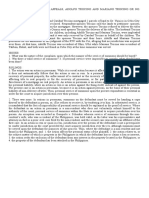0 ratings0% found this document useful (0 votes)
56 views45 Republic v. Roque
45 Republic v. Roque
Uploaded by
Janine MaliniasThis document discusses a case regarding the constitutionality of certain sections of the Republic Act 9372. Private respondents filed a petition for declaratory relief challenging the constitutionality of the act. The Supreme Court ruled that the Regional Trial Court gravely abused its discretion in denying the motion to dismiss the petition. The Supreme Court found that the private respondents failed to satisfy all the requisites for an action for declaratory relief, specifically that there was no actual justiciable controversy and the issues were not ripe for determination. Therefore, the Supreme Court granted the petition and dismissed the case for declaratory relief.
Copyright:
© All Rights Reserved
Available Formats
Download as DOCX, PDF, TXT or read online from Scribd
45 Republic v. Roque
45 Republic v. Roque
Uploaded by
Janine Malinias0 ratings0% found this document useful (0 votes)
56 views3 pagesThis document discusses a case regarding the constitutionality of certain sections of the Republic Act 9372. Private respondents filed a petition for declaratory relief challenging the constitutionality of the act. The Supreme Court ruled that the Regional Trial Court gravely abused its discretion in denying the motion to dismiss the petition. The Supreme Court found that the private respondents failed to satisfy all the requisites for an action for declaratory relief, specifically that there was no actual justiciable controversy and the issues were not ripe for determination. Therefore, the Supreme Court granted the petition and dismissed the case for declaratory relief.
Original Description:
CASE DIGEST
Copyright
© © All Rights Reserved
Available Formats
DOCX, PDF, TXT or read online from Scribd
Share this document
Did you find this document useful?
Is this content inappropriate?
This document discusses a case regarding the constitutionality of certain sections of the Republic Act 9372. Private respondents filed a petition for declaratory relief challenging the constitutionality of the act. The Supreme Court ruled that the Regional Trial Court gravely abused its discretion in denying the motion to dismiss the petition. The Supreme Court found that the private respondents failed to satisfy all the requisites for an action for declaratory relief, specifically that there was no actual justiciable controversy and the issues were not ripe for determination. Therefore, the Supreme Court granted the petition and dismissed the case for declaratory relief.
Copyright:
© All Rights Reserved
Available Formats
Download as DOCX, PDF, TXT or read online from Scribd
Download as docx, pdf, or txt
0 ratings0% found this document useful (0 votes)
56 views3 pages45 Republic v. Roque
45 Republic v. Roque
Uploaded by
Janine MaliniasThis document discusses a case regarding the constitutionality of certain sections of the Republic Act 9372. Private respondents filed a petition for declaratory relief challenging the constitutionality of the act. The Supreme Court ruled that the Regional Trial Court gravely abused its discretion in denying the motion to dismiss the petition. The Supreme Court found that the private respondents failed to satisfy all the requisites for an action for declaratory relief, specifically that there was no actual justiciable controversy and the issues were not ripe for determination. Therefore, the Supreme Court granted the petition and dismissed the case for declaratory relief.
Copyright:
© All Rights Reserved
Available Formats
Download as DOCX, PDF, TXT or read online from Scribd
Download as docx, pdf, or txt
You are on page 1of 3
REPUBLIC OF THE PHILIPPINES vs.
HERMINIO HARRY ROQUE (EN
BANC)
G.R. No. 204603; September 24, 2013 (R E S O L U T I O N)
PERLAS-BERNABE, J.:
Facts:
On July 17, 2007, private respondents filed a Petition 6 for declaratory relief
before the RTC, assailing the constitutionality of several sections of RA
9372. Petitioners moved to suspend the proceedings, 18 averring that certain
petitions (SC petitions) raising the issue of RA 9372’s constitutionality have
been lodged before the Court. 19 The said motion was granted in an Order
dated October 19, 2007.20 On October 5, 2010, the Court promulgated its
Decision21 in the Southern Hemisphere cases and thereby dismissed the
SC petitions.
Petitioners filed the subject motion to dismiss, 22 contending that private
respondents failed to satisfy the requisites for declaratory relief. Likewise,
they averred that the constitutionality of RA 9372 had already been upheld
by the Court in the Southern Hemisphere cases.
In their Comment/Opposition,23 private respondents countered that: (a) the
Court did not resolve the issue of RA 9372’s constitutionality in Southern
Hemisphere as the SC petitions were dismissed based purely on technical
grounds; and (b) the requisites for declaratory relief were met.
Issues:
1. Whether or not the RTC gravely abused its discretion when it denied
the subject motion to dismiss.
2. Whether or not private respondents failed to satisfy the requirements
for declaratory relief.
Ruling:
1. No. An act of a court or tribunal can only be considered as with grave
abuse of discretion when such act is done in a capricious or
whimsical exercise of judgment as is equivalent to lack of
jurisdiction.28 It is well-settled that the abuse of discretion to be
qualified as "grave" must be so patent or gross as to constitute an
evasion of a positive duty or a virtual refusal to perform the duty or to
act at all in contemplation of law.29 In this relation, case law states
that not every error in the proceedings, or every erroneous conclusion
of law or fact, constitutes grave abuse of discretion. 30 The degree of
gravity, as above-described, must be met.
Applying these principles, the Court observes that while no
grave abuse of discretion could be ascribed on the part of the RTC
when it found that the Court did not pass upon the constitutionality of
RA 9372 in the Southern Hemisphere cases, it, however, exceeded
its jurisdiction when it ruled that private respondents’ petition had met
all the requisites for an action for declaratory relief. Consequently, its
denial of the subject motion to dismiss was altogether improper.
2. No. Case law states that the following are the requisites for an action
for declaratory relief:
First , the subject matter of the controversy must be a deed,
will, contract or other written instrument, statute, executive order or
regulation, or ordinance; second , the terms of said documents and
the validity thereof are doubtful and require judicial construction;
third , there must have been no breach of the documents in question;
fourth , there must be an actual justiciable controversy or the
"ripening seeds" of one between persons whose interests are
adverse; fifth , the issue must be ripe for judicial determination; and
sixth , adequate relief is not available through other means or other
forms of action or proceeding.34
Based on a judicious review of the records, the Court observes
that while the first,35 second,36 and third37 requirements appear to
exist in this case, the fourth, fifth, and sixth requirements, however,
remain wanting. As to the fourth requisite, there is serious doubt that
an actual justiciable controversy or the "ripening seeds" of one exists
in this case.
All told, in view of the absence of the fourth and fifth requisites
for an action for declaratory relief, as well as the irrelevance of the
sixth requisite, private respondents’ petition for declaratory relief
should have been dismissed. Thus, by giving due course to the
same, it cannot be gainsaid that the RTC gravely abused its
discretion.
Dispositive Portion:
WHEREFORE, the petition is GRANTED. Accordingly, the April 23, 2012
and July 31, 2012 Orders of the Regional Trial Court of Quezon City,
Branch 92 in SCA No. Q-07-60778 are REVERSED and SET ASIDE and
the petition for declaratory relief before the said court is hereby
DISMISSED.
Quick Digest:
● Requisites for an action for declaratory relief:
1. The subject matter of the controversy must be a deed, will, contract
or other written instrument, statute, executive order or regulation, or
ordinance;
2. The terms of said documents and the validity thereof are doubtful and
require judicial construction;
3. there must have been no breach of the documents in question;
4. there must be an actual justiciable controversy or the “ripening seeds”
of one between persons whose interests are adverse
5. the issue must be ripe for judicial determination;
6. adequate relief is not available through other means or other forms of
action or proceeding.
● An act of a court or tribunal can only be considered as with grave
abuse of discretion when such act is done in a capricious or
whimsical exercise of judgment as is equivalent to lack of jurisdiction;
Case law states that not every error in the proceedings, or every
erroneous conclusion of law or fact, constitutes grave abuse of
discretion.
You might also like
- 715 in The Matter of The Testate Estate of Aida A. Bambao vs. Cosme B...., G.R. No. 237449. December 2, 2020Document7 pages715 in The Matter of The Testate Estate of Aida A. Bambao vs. Cosme B...., G.R. No. 237449. December 2, 2020KatrinaNo ratings yet
- Isidro Hildawa v. Ministry of Defense, GR L-67766, Aug 14, 1985Document3 pagesIsidro Hildawa v. Ministry of Defense, GR L-67766, Aug 14, 1985Austin Viel Lagman MedinaNo ratings yet
- Bayani Vs Collector of CustomsDocument4 pagesBayani Vs Collector of CustomsLennart ReyesNo ratings yet
- PoliRev Prelims Reviewer 2019Document18 pagesPoliRev Prelims Reviewer 2019Elle Alorra RubenfieldNo ratings yet
- Socrates Vs Comelec, GR No 154512, November 12, 2002Document8 pagesSocrates Vs Comelec, GR No 154512, November 12, 2002Hann Faye BabaelNo ratings yet
- In Re EdillionDocument1 pageIn Re EdillionScribd ManNo ratings yet
- Republic v. Court of Appeals, G.R. No. 108998, August 24, 1994Document18 pagesRepublic v. Court of Appeals, G.R. No. 108998, August 24, 1994KadzNituraNo ratings yet
- Members: Below Are Additional Random Excerpts From The Paper..Document15 pagesMembers: Below Are Additional Random Excerpts From The Paper..myfamily_anithaNo ratings yet
- Suplico V NedaDocument14 pagesSuplico V NedaAiaEngnanNo ratings yet
- Bar Matter No 850-McleDocument8 pagesBar Matter No 850-Mclechristian_santos_64No ratings yet
- Senate V ErmitaDocument1 pageSenate V ErmitaJANINE ZYRELLE AWATNo ratings yet
- Baldos vs. CADocument7 pagesBaldos vs. CAAji AmanNo ratings yet
- 09 National Housing Corporation vs. Juco 134 SCRA 172, January 17, 1985 - EscraDocument19 pages09 National Housing Corporation vs. Juco 134 SCRA 172, January 17, 1985 - EscraJNo ratings yet
- Labrel Cases MidtermsDocument219 pagesLabrel Cases MidtermsReuben EscarlanNo ratings yet
- Bagong Bayani v. COMELEC, GR No. 147589, June 26, 2001Document6 pagesBagong Bayani v. COMELEC, GR No. 147589, June 26, 2001Judy Anne RamirezNo ratings yet
- Daplas Vs Department of FinanceDocument3 pagesDaplas Vs Department of FinanceElyn ApiadoNo ratings yet
- The Plight of ABS CBN by Justice Noel Gimenez Tijam Ret.Document26 pagesThe Plight of ABS CBN by Justice Noel Gimenez Tijam Ret.Rhege AlvarezNo ratings yet
- Oscar Ramos vs. CADocument9 pagesOscar Ramos vs. CAMariaFaithFloresFelisartaNo ratings yet
- Garcia v. Executive SecretaryDocument2 pagesGarcia v. Executive SecretaryERNIL L BAWANo ratings yet
- 05) Garcia Vs COADocument3 pages05) Garcia Vs COAAlexandraSoledadNo ratings yet
- Finals HR Case DigestDocument3 pagesFinals HR Case DigestWresen AnnNo ratings yet
- Rodriguez v. Tan, G.R. No. L-6044, November 24, 1952 (92 Phil 273)Document3 pagesRodriguez v. Tan, G.R. No. L-6044, November 24, 1952 (92 Phil 273)ryanmeinNo ratings yet
- Hacienda Luisita Vs PARCDocument12 pagesHacienda Luisita Vs PARCJumen TamayoNo ratings yet
- 057 G.R. No. 119602 October 6, 2000 Wildvalley Shipping Co. LTD Vs CADocument8 pages057 G.R. No. 119602 October 6, 2000 Wildvalley Shipping Co. LTD Vs CArodolfoverdidajrNo ratings yet
- 2004 Rules On Notarial Practice NotesDocument4 pages2004 Rules On Notarial Practice NotesRobie SalcedoNo ratings yet
- Elect Cases XIII Failure of ElecDocument10 pagesElect Cases XIII Failure of ElecMeet MeatNo ratings yet
- Mitsubishi Motors Case (Taxation)Document2 pagesMitsubishi Motors Case (Taxation)julieanne07No ratings yet
- PEREZ & DORIA V. PT&T (G.R. No. 152048, April 7, 2009)Document3 pagesPEREZ & DORIA V. PT&T (G.R. No. 152048, April 7, 2009)EPZ RELANo ratings yet
- DBP Vs CADocument16 pagesDBP Vs CAJasielle Leigh UlangkayaNo ratings yet
- CLU vs. Exec. Secretary, 194 SCRA 317 (1991)Document1 pageCLU vs. Exec. Secretary, 194 SCRA 317 (1991)Reginald Dwight FloridoNo ratings yet
- Reyes Vs Comelec DigestDocument1 pageReyes Vs Comelec DigestMarc Dave AlcardeNo ratings yet
- SEC v. Universal Rightfield Property Holdings, Inc., G.R. No. 181381Document12 pagesSEC v. Universal Rightfield Property Holdings, Inc., G.R. No. 181381Rhenfacel Manlegro100% (1)
- 66 Bayan V Executive SecretaryDocument20 pages66 Bayan V Executive SecretaryYhan AberdeNo ratings yet
- Civil Procedure Topic:Representatives As Parties Case Title: GR No.: 101083 Date: July 30, 1993 Ponente: DAVIDE, JR., J.Document4 pagesCivil Procedure Topic:Representatives As Parties Case Title: GR No.: 101083 Date: July 30, 1993 Ponente: DAVIDE, JR., J.Angelica Fojas RañolaNo ratings yet
- San Miguel Foods, Inc.-Cebu B-Meg Feed Plant vs. Hon. Bienvenido LaguesmaDocument27 pagesSan Miguel Foods, Inc.-Cebu B-Meg Feed Plant vs. Hon. Bienvenido Laguesmapatricia.aniyaNo ratings yet
- Statutes Proper (Legislative Enactments) : Insular Government Unincorporated TerritoryDocument5 pagesStatutes Proper (Legislative Enactments) : Insular Government Unincorporated TerritoryMarivic Asilo Zacarias-LozanoNo ratings yet
- Rule 6 Kinds of PleadingsDocument2 pagesRule 6 Kinds of PleadingsReve VelvetNo ratings yet
- Alejandrino v. QuezonDocument1 pageAlejandrino v. QuezonChristian Lemuel Tangunan TanNo ratings yet
- Doctrines in Labor RelationsDocument27 pagesDoctrines in Labor RelationsJoshua LaronNo ratings yet
- Bayan Muna Vs Comelec G.R. No. 179295Document3 pagesBayan Muna Vs Comelec G.R. No. 179295Dewmabel BaconawaNo ratings yet
- Consti Batch 1 Case DigestDocument74 pagesConsti Batch 1 Case DigestayasueNo ratings yet
- PD 679Document2 pagesPD 679Matt Carlos MejosNo ratings yet
- Magalang vs. Pagcor, G.R. No. 190566, Dec. 11, 2013Document9 pagesMagalang vs. Pagcor, G.R. No. 190566, Dec. 11, 2013Vox PopuliNo ratings yet
- 014 VILLAVICENCIO Oñate v. COADocument2 pages014 VILLAVICENCIO Oñate v. COASalve VillavicencioNo ratings yet
- 7 - Agilent Technologies Vs Integrated Silicon Tech PDFDocument3 pages7 - Agilent Technologies Vs Integrated Silicon Tech PDFNicole PTNo ratings yet
- Philip Sigfrid Fortun v. Gloria Macapagal-Arroyo, Et AlDocument3 pagesPhilip Sigfrid Fortun v. Gloria Macapagal-Arroyo, Et AlAnonymous NqaBAyNo ratings yet
- Dacudao Vs DojDocument3 pagesDacudao Vs DojZjai SimsNo ratings yet
- 2 Case Digest Diocese of Bacolod Vs ComelecDocument10 pages2 Case Digest Diocese of Bacolod Vs ComelecNeil Glova Jr100% (1)
- 303 Creative LLC Et Al V Elenis Et AlDocument10 pages303 Creative LLC Et Al V Elenis Et AlDavid HartNo ratings yet
- Shauf v. Court of Appeals, 1990 PDFDocument2 pagesShauf v. Court of Appeals, 1990 PDFLawiswisNo ratings yet
- Marcos vs. Manglapus, 177 SCRA 668Document34 pagesMarcos vs. Manglapus, 177 SCRA 668FranzMordenoNo ratings yet
- Asuncion v. National Labor Relations CommissionDocument4 pagesAsuncion v. National Labor Relations CommissionAngelette BulacanNo ratings yet
- Case No. 7: Lina, Jr. vs. CariñoDocument2 pagesCase No. 7: Lina, Jr. vs. CariñoAlmiraNo ratings yet
- CIR v. Primetown Property Group (531 SCRA 436)Document8 pagesCIR v. Primetown Property Group (531 SCRA 436)Karl MinglanaNo ratings yet
- Estrada vs. Arroyo G.R. No. 146738 March 2, 2001 FactsDocument5 pagesEstrada vs. Arroyo G.R. No. 146738 March 2, 2001 FactsJovelan V. EscañoNo ratings yet
- Port Workers Union Vs Laguesma (1992)Document8 pagesPort Workers Union Vs Laguesma (1992)GRNo ratings yet
- NHA v. RoxasDocument6 pagesNHA v. RoxasbrownboomerangNo ratings yet
- Lagman vs. Executive Secretary G.R. No. 197422. November 03, 2020Document74 pagesLagman vs. Executive Secretary G.R. No. 197422. November 03, 2020JESSICA RHEA CRUZNo ratings yet
- Eagle Realty Corporation vs. Republic of The Philippines G.R. No. 151424. July 31, 2009Document2 pagesEagle Realty Corporation vs. Republic of The Philippines G.R. No. 151424. July 31, 2009TENsai1986No ratings yet
- REPUBLIC v. ROQUEDocument1 pageREPUBLIC v. ROQUEAnjNo ratings yet
- Republic Vs RoqueDocument4 pagesRepublic Vs RoqueERNIL L BAWANo ratings yet
- CourtsDocument3 pagesCourtsPamela ApacibleNo ratings yet
- 44 Municipality of Tupi Vs FaustinoDocument2 pages44 Municipality of Tupi Vs FaustinoJanine MaliniasNo ratings yet
- 51 Hilbero v. Morales, Jr.Document3 pages51 Hilbero v. Morales, Jr.Janine MaliniasNo ratings yet
- Perez Vs Catindig Case DigestDocument5 pagesPerez Vs Catindig Case DigestJanine MaliniasNo ratings yet
- BERNALDEZ Vs ANQUILO-GARCIADocument3 pagesBERNALDEZ Vs ANQUILO-GARCIAJanine MaliniasNo ratings yet
- Republic of The Philippines v. Edna Orcelino-Villanueva DigestDocument2 pagesRepublic of The Philippines v. Edna Orcelino-Villanueva DigestJanine MaliniasNo ratings yet
- Republic of The Philippines Vs Tango DigestDocument2 pagesRepublic of The Philippines Vs Tango DigestJanine MaliniasNo ratings yet
- RONULO v. PPDocument2 pagesRONULO v. PPJanine MaliniasNo ratings yet
- The Malaysian JudiciaryDocument34 pagesThe Malaysian Judiciarymsyukriismail_803274No ratings yet
- Astorga & Repol Law Offices vs. VillanuevaDocument38 pagesAstorga & Repol Law Offices vs. VillanuevaMP ManliclicNo ratings yet
- James M. Diperri v. Federal Aviation Administration, 671 F.2d 54, 1st Cir. (1982)Document8 pagesJames M. Diperri v. Federal Aviation Administration, 671 F.2d 54, 1st Cir. (1982)Scribd Government DocsNo ratings yet
- Commercial Court 2015 171Document11 pagesCommercial Court 2015 171ODONG ChristopherNo ratings yet
- Supreme CourtDocument14 pagesSupreme CourtchibilexNo ratings yet
- Akufoaddo and Others Vrs Mahama and Another 2013 GHASC 137 (22 January 2013)Document60 pagesAkufoaddo and Others Vrs Mahama and Another 2013 GHASC 137 (22 January 2013)Joseph Boadi SekyereNo ratings yet
- Espiritu Vs Ca - Full TextDocument8 pagesEspiritu Vs Ca - Full TextMarga RethNo ratings yet
- Struck by Lightning Death PenaltyDocument38 pagesStruck by Lightning Death PenaltyMosi Ngozi (fka) james harrisNo ratings yet
- 03 Basbas V BasbasDocument11 pages03 Basbas V BasbasDan RamosNo ratings yet
- Item 48 NS (Quashing) (Dictated) DastiDocument3 pagesItem 48 NS (Quashing) (Dictated) DastiSidd ZeusNo ratings yet
- Advanced Internet Technologies, Inc. v. Google, Inc. - Document No. 16Document1 pageAdvanced Internet Technologies, Inc. v. Google, Inc. - Document No. 16Justia.comNo ratings yet
- 78 People vs. Fernandez, Et Al., 183 SCRA 511, March 22, 1990Document2 pages78 People vs. Fernandez, Et Al., 183 SCRA 511, March 22, 1990Rex100% (1)
- Exceptions To The Immutability of Final JudgmentsDocument3 pagesExceptions To The Immutability of Final JudgmentsMikko AcubaNo ratings yet
- (PS) Kunkel v. State of CA Dept of Transportation, Et Al - Document No. 5Document4 pages(PS) Kunkel v. State of CA Dept of Transportation, Et Al - Document No. 5Justia.comNo ratings yet
- Protecting Your Rights: DUI Defense in Avondale by My AZ LawyersDocument7 pagesProtecting Your Rights: DUI Defense in Avondale by My AZ LawyersCandace KallenNo ratings yet
- Affidavit of Service: THAT I, ALDREN LEE HILADO, of Legal Age, Filipino, Married, and A Resident of 21Document2 pagesAffidavit of Service: THAT I, ALDREN LEE HILADO, of Legal Age, Filipino, Married, and A Resident of 21Martoni SaliendraNo ratings yet
- Valmonte v. CADocument14 pagesValmonte v. CAAlbert Daba IIINo ratings yet
- Tocao, Et Al. v. Court of Appeals, Et Al., G.R. No. 127405, October 4, 2000Document2 pagesTocao, Et Al. v. Court of Appeals, Et Al., G.R. No. 127405, October 4, 2000Emmanuel SilangNo ratings yet
- Transcript of January 10 Deposition of Elena SvensonDocument19 pagesTranscript of January 10 Deposition of Elena SvensonSLAVEFATHERNo ratings yet
- 2020 Omnibus AffidavitDocument2 pages2020 Omnibus AffidavitCherry PanoNo ratings yet
- Bharat Petroleum Corporation Limited vs. Thakorbhai Ranchhodji Desai and Ors. (21.02.2003 - BOMHC)Document9 pagesBharat Petroleum Corporation Limited vs. Thakorbhai Ranchhodji Desai and Ors. (21.02.2003 - BOMHC)Jating JamkhandiNo ratings yet
- Restore Civil Rights FormDocument6 pagesRestore Civil Rights FormlazzycazzNo ratings yet
- Miller Vs MardoDocument6 pagesMiller Vs MardoDax MonteclarNo ratings yet
- Larranaga Vs CADocument3 pagesLarranaga Vs CAlinlin_17100% (1)
- Specpro CasesDocument4 pagesSpecpro Casesjamilove20No ratings yet
- People v. BeronillaDocument1 pagePeople v. BeronillaThird VillareyNo ratings yet
- 01 Gomez Vs CADocument1 page01 Gomez Vs CADean BenNo ratings yet
- In Re Rolando Abadilla Etal Vs FVRamos EtalDocument9 pagesIn Re Rolando Abadilla Etal Vs FVRamos EtalElaine HonradeNo ratings yet



